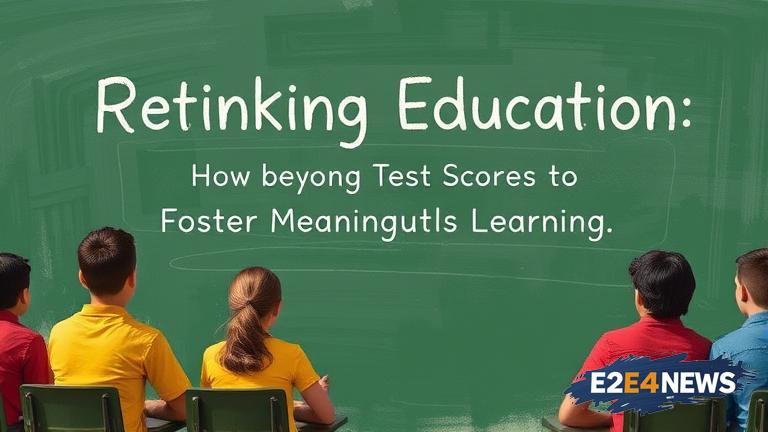The conventional education system has long been criticized for its overemphasis on test scores and rote memorization. While these metrics can provide a snapshot of a student’s academic performance, they often fail to capture the full range of skills and abilities that are essential for success in the 21st century. Moreover, an excessive focus on test scores can lead to a narrow and uninspiring learning experience, causing students to feel disconnected from the material and disillusioned with the education system as a whole. To address this issue, educators and policymakers must work together to create a more holistic and student-centered approach to learning. This can involve incorporating project-based learning, experiential education, and community engagement into the curriculum, as well as providing students with more autonomy and choice in their academic pursuits. By giving students the freedom to explore their interests and passions, educators can help them develop a sense of purpose and meaning that extends far beyond the classroom. Furthermore, this approach can also help to foster essential life skills such as critical thinking, creativity, and collaboration, which are highly valued by employers and essential for success in an increasingly complex and interconnected world. In addition, educators must also prioritize social-emotional learning, recognizing that students’ emotional and psychological well-being is deeply intertwined with their academic performance. This can involve teaching students mindfulness, self-awareness, and self-regulation techniques, as well as providing them with access to counseling and mental health services. By taking a more comprehensive and compassionate approach to education, we can help students develop into capable, confident, and compassionate individuals who are equipped to thrive in all aspects of life. The benefits of this approach are numerous, ranging from improved academic performance and increased student engagement to enhanced creativity and better mental health outcomes. Moreover, by moving beyond test scores and embracing a more nuanced and multifaceted definition of success, we can help to create a more just and equitable education system that truly serves the needs of all students. This, in turn, can have a profound impact on society as a whole, helping to foster a more informed, empathetic, and engaged citizenry that is better equipped to address the complex challenges of the 21st century. Ultimately, the goal of education should be to help students find meaning and purpose in their lives, and to provide them with the skills, knowledge, and support they need to pursue their passions and make a positive impact in the world. By rethinking our approach to education and moving beyond the limitations of test scores, we can help to create a brighter, more compassionate, and more sustainable future for all. The time has come to redefine what it means to be an educated person, and to recognize that success is not solely defined by academic achievement, but by the positive contributions we make to society. As we move forward, it is essential that we prioritize the needs and well-being of students, and work to create an education system that is truly designed to help them thrive. This will require a fundamental transformation of our education system, one that prioritizes depth over breadth, and emphasizes the development of essential life skills over the mere accumulation of knowledge. By working together, we can create a more just, equitable, and compassionate education system that truly serves the needs of all students, and helps them to find meaning and purpose in their lives. The future of education depends on our ability to think creatively, to challenge assumptions, and to prioritize the needs and well-being of students. As we embark on this journey, it is essential that we remain committed to the values of empathy, compassion, and social responsibility, and work to create an education system that truly reflects the needs and aspirations of our global community.
